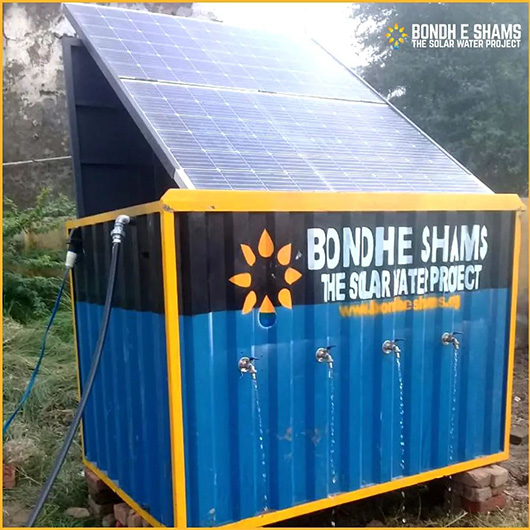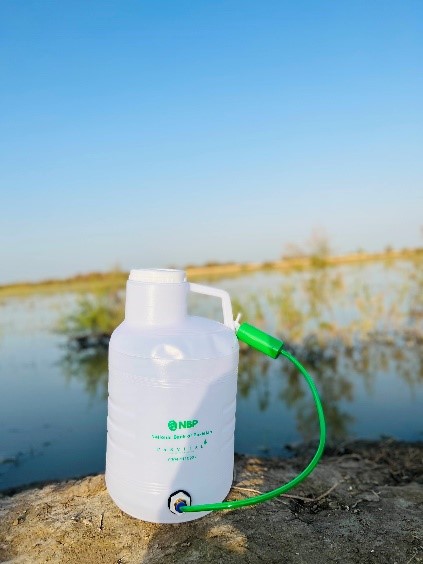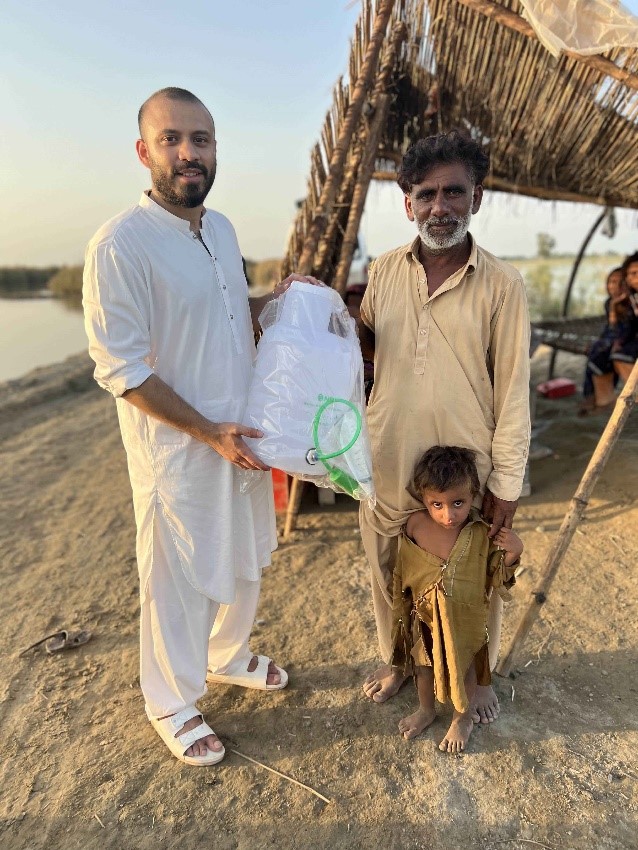KARACHI: After massive floods wreaked havoc and forced hundreds of thousands of Pakistanis out of homes with no water and food, Pakistani technology-based startups have come up with innovative solutions to provide clean drinking water to the affected masses in times of a national disaster.
Flash floods caused by unprecedented monsoon rains and glacier melt have killed 1,545 people across the South Asian country since mid-June and affected over 33 million, according to the National Disaster Management Authority (NDMA).
The floods have inundated a third of the country and the devastation, particularly in the southern and southwestern regions, has deprived thousands of families of basic necessities such as clean drinking water.
Bondh e Shams, an Islamabad-based non-profit organization, is trying to provide this basic necessity to the affected people by filtering floodwater into drinkable water by using a device, called Solar Water Box.

In this undated picture, a Solar Water Box filters floodwater into clean drinking water using solar energy in Sindh, Pakistan. (Photo courtesy Bondh e Shams)
“We did not create this device for flood victims, we prepared it for villages in Sindh, where people were drinking water from ponds,” Hamza Farrukh, the founder of Bondh e Shams, told Arab News on Friday.
“When the floods came, we saw entire Sindh become a huge pond. We had a few units ready so we decided to be on the ground as quickly as possible.”
Farrukh said they used 25 already prepared devices as a response to the disaster and dispatched them to flood-hit areas in the southern Sindh, southern Punjab and the northwestern Khyber Pakhtunkhwa province. He said the organization intends to send a couple of more batches, with 25 units each, to these areas in the coming weeks.

In this undated picture, a Solar Water Box provides clean and safe drinking water to flood affectees in Dhoronaro area of Sindh, Pakistan. (Photo courtesy Bondh e Shams)
Farrukh, a 29-year-old graduate of Economics, International Relations & Leadership Studies from the University of Oxford’s Williams College, launched the Solar Water Box project in his village near Chakwal in Punjab province in 2014. He said the boxes had been in the works since 2018, but the devices sent to flood-hit areas were more of a construct of 2021.
The Solar Water Box draws contaminated water from one side that goes through 2-3 layers of filtration, after which the water is stored in the box. Anyone can press a button, open the tap and get clean drinking water, according to Farrukh.

In this undated picture, units of portable water filtration system, Every Water, are connected to 15-litre jerry cans that can work anywhere under gravity. (Photo courtesy PakVitae Pvt Ltd)
It can filter up to 8,000-10,000 liters of water a day and can be used for up to 25 years. Bondh e Shams prepares these devices with the help of its donors and each Solar Water Box costs Rs1,000,000 ($4,200).
Farrukh said the Solar Water Box emerged as one of the major disaster response solutions in the wake of the floods and it could in fact be a long-term solution to the problem in those areas.
According to World Health Organization (WHO), the most common risks associated with flooding is the contamination of drinking water facilities and standing floodwater, which may result in the spread of several diseases.
Another Pakistani startup, PakVitae Pvt Ltd, has deployed its portable water filtration systems, called Every Water, in remote areas of Sindh, Balochistan, Punjab and Khyber Pakhtunkhwa provinces to help people fight waterborne diseases like cholera.
“Our filters are portable and designed for situations such as floods, wherever there is an epidemic of a waterborne disease,” Shayan Sohail, chief operating officer (COO) of PakVitae who is currently in Sindh’s Kashmore district, told Arab News on Friday.
PakVitae is a startup out of the National Incubation Center (NIC) in Lahore that has found a solution to contaminated drinking water. It has been around for over five years.
The organization was preparing to distribute 10,000 Every Water units in the southwestern Pakistani district of Dera Bugti this year to study the impact of these filters, therefore, it had sufficient inventory when the floods hit Pakistan. The filtration system can work anywhere under gravity as it is connected to a 15-liter jerry can.
“As soon as the devastation began, I knew we need this product. All the infrastructure had destroyed, with no houses left,” the 27-year-old COO, who is a chemical engineer, told Arab News.
“We needed an immediate intervention so we started distributing these units. The National Bank of Pakistan (NBP) allowed us to divert 10,000 devices that we had prepared toward these flood-affected people.”

In this undated picture, Shayan Sohail, chief operating officer of PakVitae Pvt Ltd, helps with distribution and demonstration efforts of EveryWater purification units in Kashmore, Pakistan. (Photo courtesy PakVitae Pvt Ltd)
He said it was a pretty compelling solution, adding that 10,000 Every Water devices could provide 100 million liters of water over a period of two years. The rate of flow of these devices is 60 liters per hour.
Sohail is currently visiting areas worst hit by floods in the southern Sindh province for fast and more effective results of these devices.
“People do not even have any land to place these jerry cans. These filters cannot work on the floor, they need height. So now we are bringing gravity bags,” he said.
“Generally, one needs 200ml water to backwash these devices but in these areas, people do not even have utensils to fill clean water with.”
PakVitae has received donations for around 150,000 units. It has so far deployed 5,000 units in flood-hit areas across Pakistan and plans to install another 15,000 in a week’s time.
The organization intends to deploy 150,000 water filtration systems across Pakistan by January 2023.
















